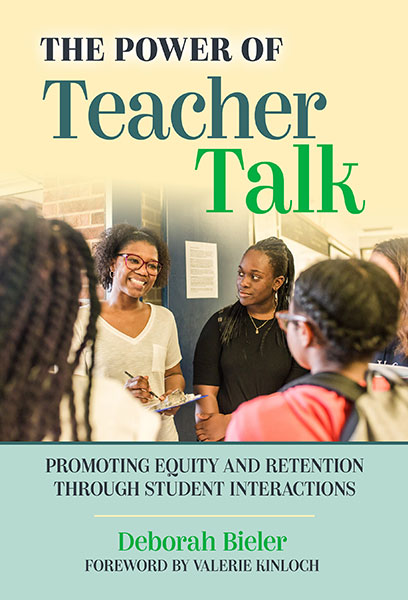Professors: Request an Exam Copy
Print copies available for US orders only. For orders outside the US, see our international distributors.
Foreword by: Valerie Kinloch
Publication Date: November 16, 2018
Pages: 168

2020 AERA Division K Exemplary Research in Teaching and Teacher Education Award
The Power of Teacher Talk investigates the connections between two persistent educational challenges: high numbers of students who drop out and of teachers who leave the profession. Based on a study of thousands of daily interactions between new justice-oriented English teachers and their students, this book proposes that teachers who show a commitment to equity in their communications can positively affect student retention and are more likely to remain in the profession. Blending vivid descriptions of classroom life with equity and language research, the author urges teachers to be aware of and intentional about the power of their interactions with students—in everything from their classroom décor and informal hallway chats to their responses to challenging moments during class and in after-class discussions. This must-read book shifts the narrative on what kinds of teaching practices matter and how teachers can and do work toward equity.
Book Features:
Deborah Bieler is an associate professor of English education at the University of Delaware.
" The Power of Teacher Talk exemplifies an ethos of love; a respect for the dignity and worth of all students that empowers teachers to seek meaningful interactions during the informal moments that frame their professional setting. Yet, The Power of Teacher Talk does far more express this ethos. Bieler’s work expresses a more equity-oriented pedagogy and demonstrates how teachers and teacher preparation programs can take steps to align their actions in ways that value students and their lived experiences."
—Teachers College Record
“(Bieler) offers us hope, compassion, and—crucially—manageable, concrete actions toward equity-oriented ELA classes.”
—English Journal
“I could not put it down. Instantly, I was drawn to her firsthand depictions of the four equity-oriented, justice-committed public high school English teachers she features. Thank you, Deb, for providing me an opportunity to learn with the teachers and students with whom you collaborated. Thank you for this beautiful, rich, and powerful text!”
—From the Foreword by Valerie Kinloch, Renée and Richard Goldman Dean and Professor, School of Education, University of Pittsburgh
"In an era ruled by technocratic logics and high-stakes testing, The Power of Teacher Talk wisely turns our attention to student interactions as a rich site of teacher work. Through careful research and rigorous analysis, Bieler enhances and complicates our understanding of how interactions can (and should) operate in everyday schooling practices. She also persuasively demonstrates that such interactions are key to creating more effective, engaging, and justice-centered educational environments. This book is a must-read for anyone interested in understanding and improving life in schools."
—Marc Lamont Hill, professor, media and urban education, Temple University; and author of Beats, Rhymes, and Classroom Life
"The Power of Teacher Talk is an indispensable resource for new and practicing teachers alike. Deborah Bieler demonstrates that social justice education is more than the content of a curriculum; it is the daily interactions between students and teachers that build relationships and empower students to reach their full potential. Steeped in practical research and teacher stories, Bieler provides a roadmap for how to create the kind of loving and critical spaces where students thrive because they feel visible and valued."
—Linda Christensen, director, Oregon Writing Project at Lewis & Clark College; editor, Rethinking Schools
"This is an incredibly important, urgent, and compelling topic and Bieler clearly establishes her authority as well as her part in the ongoing conversations about new teacher burnout and student dropout."
—Jeffrey Wilhelm, Boise State University
Tentative Table of Contents
Foreword by Valerie Kinloch
Acknowledgments
Chapter 1. Introduction: Teacher/Student Interactions, Retention, and Equity
The Retention Curriculum of Interactions
Equity-Oriented Teachers: A Definition
The Role of Equity-Oriented Teachers in Retention
The Role of Contexts
The NETS Context
A Brief Description of Research Methods
Book Overview
Chapter 2. Classroom Décor as Interaction: Teachers' Equity Orientations Made Visible in Local Contexts
Considering Local Contexts, Figured Worlds, Artifacts, and Pivoting
Using Personal Items as Pivotal Visual Anchors in Local Contexts
Creating Visual Equity-Oriented Curriculum in the Absence of Pushout Culture
Creating a Visual Respite from Pushout Culture
Conclusion: Enacting Equity-Oriented Teaching with Strategic Classroom Décor
Questions for Teacher Reflection, Discussion, and Action
Chapter 3. Impromptu Teacher/Student Interactions: The Most Important Classroom Texts
The Significance of Impromptu Classroom Interactions
The Analysis of Classroom Interactions
The Humane Foundation of, and the Cracks in, Teachers' Interactions with Focal Students
Conclusion: Filling the Cracks in the Foundation
Questions for Teacher Reflection, Discussion, and Action
Chapter 4. The Crucial Curriculum of Before and After Class
Recognizing the Hybrid Uniqueness of Before- and After-Class Timespaces
Making Humane Connections Between Classes as Equity Pedagogy
Examining the Prominence of the Procedural with Students Who Failed English
Conclusion: Overcoming Busyness to Connect with Students between Classes
Questions for Teacher Reflection, Discussion, and Action
Chapter 5. Staying to Talk with Students Who Are Falling Through the Cracks
A Staying-to-Talk Example
Focus on Student Potential and the Need for Change
Conclusion: "Realize Love in Word and Deed" by Staying to Talk
Questions for Teacher Reflection, Discussion, and Action
Chapter 6. Conclusion: Interacting with a New Taxonomy for Equity-Oriented Teaching
Prioritizing Interactions in Teacher Preparation
A Call to Action
Epilogue
References
Index
About the Author
2020 AERA Division K Exemplary Research in Teaching and Teacher Education Award
Professors: Request an Exam Copy
Print copies available for US orders only. For orders outside the US, see our international distributors.